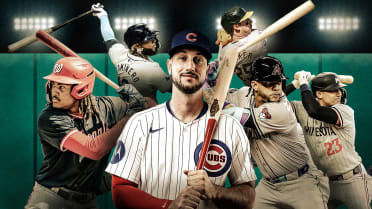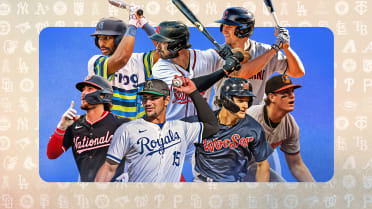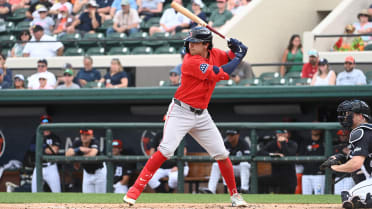6 reasons Todd Helton belongs in the Hall
Todd Helton has been trending in the right direction over the first five years of his eligibility on the Baseball Writers' Association of America's Hall of Fame ballot. Last year, he garnered 72.2 percent of the vote, with 75 percent needed for election and enshrinement in Cooperstown.
As he seeks to become the second Rockies player to receive baseball's highest individual honor, joining former teammate Larry Walker, here's a look at six reasons why Helton should have a plaque hanging in the hallowed gallery of the Baseball Hall of Fame and Museum.
Let's deal with Coors right off the bat: Helton's road numbers are Hall-worthy
Helton played his entire 17-year MLB career with the Rockies, which means he played all of his home games at the hitter's paradise that is Coors Field. So, naturally, the Hall of Fame voter has to take into account whether the inevitably inflated numbers from hitting in the altitude of Denver are enough to disqualify Helton from a place in Cooperstown.
Stripping out his Coors Field numbers entirely, Helton was a great hitter. In 4,612 road plate appearances, the slugging first baseman hit .287/.386/.469 with 142 home runs. His .855 OPS away from his home ballpark is higher than the road OPS of Hall of Famers Dave Winfield (.841), Eddie Murray (.838), Rickey Henderson (.836), Tony Gwynn (.835), Al Kaline (.827) and George Brett (.826), among others.
And when it comes to on-base percentage, Helton's .386 OBP on the road is higher than Hall of Famers Rod Carew (.385), Gwynn (.384), Honus Wagner (.383), Willie Mays (.382), Eddie Mathews (.382), Joe Morgan (.380), Tim Raines (.378), Vladimir Guerrero (.376), Fred McGriff (.376), Frank Robinson (.376), Harmon Killebrew (.373), Willie McCovey (.372), Derek Jeter (.370), Helton's former teammate Walker (.370), Hank Aaron (.369), Kaline (.369), Duke Snider (.369) and the list goes on.
Helton's road stats are Hall-worthy, and that's not even counting his incredible numbers at Coors Field.
He was pretty good at Coors, too
We've addressed the Coors issue by taking Coors out of the picture. Now, let's bring it back in, because how great do your numbers have to be in altitude to prove you're a great hitter? If you're absurdly good in the altitude of Colorado, does that count for nothing?
Helton's numbers there are phenomenal, and even with the Coors discount, they make his Hall of Fame case even stronger. In 4,841 home plate appearances, he hit .345/.441/.607 with 227 home runs at the corner of 20th and Blake Street in Lower Downtown Denver.
He won many accolades, and should've had more
Helton was more than just a superb hitter -- he played great defense at first base, as well. That's evidenced by his three career Gold Glove Awards (2001, '02 and '04). He was also selected as an All-Star five times and a Silver Slugger Award winner four times.
In 2000, he had the finest all-around season of any player in the National League by several measures, but he was not voted the league's Most Valuable Player -- that honor went to Giants second baseman Jeff Kent.
But should it have really gone to Kent?
Kent had a tremendous 2000 campaign, but Helton's was simply better -- Helton's 8.9 Baseball Reference wins above replacement were nearly two wins better than Kent's (7.2), and the second-highest bWAR in the NL that season belonged to Andruw Jones (8.2). Helton won the slash line Triple Crown in the NL that year, hitting .372/.463/.698, with his batting average and slugging percentage leading the Majors. He also had MLB's highest OPS among qualified hitters, at 1.162. Yet he finished fifth in NL MVP voting.
Lest you're tempted to bring Coors up, Helton slashed .353/.441/.633 away from home in 2000. He could easily have an MVP Award to his name from that season.
His peak was incredible, even when adjusted for altitude
Back injuries slowed Helton toward the end of his career, but he had one of the all-time great peaks from 2000-05. Over that six-season span, only two players produced more bWAR than Helton's 42.1: Alex Rodriguez (52.9) and Barry Bonds (51.7). And only Bonds (240), Albert Pujols (167), Jason Giambi (166) and Manny Ramirez (165) had a higher OPS+ among qualified batters than Helton's 158 in that period.
He's the all-time face of the Rockies' franchise
The first Rockies player to be inducted into the Hall of Fame, Walker, may have been the best all-around player to ever suit up for Colorado, but Helton is undeniably "Mr. Rockie." No. 17 spent his entire 17-year career with the club, and he helped lead it to its only World Series berth in 2007.
Helton is at the center of countless iconic franchise moments and milestones, and his No. 17 was the first to be retired by the Rockies (Walker's 33 and Jackie Robinson's 42 are the only other numbers the team has retired). The "Toddfather," as he is affectionately known in Colorado, is the greatest Rockie of them all.
He fits right in with the current first basemen in Cooperstown
According to Jay Jaffe's JAWS system of rating players at each position, Helton ranks 15th all-time among first basemen. That's higher than Hall of Famers Murray, Hank Greenberg, George Sisler, Bill Terry, Killebrew, McGriff, Orlando Cepeda, Gil Hodges and others.
Compared with the average Hall of Fame first baseman, Helton stacks up well. He produced 61.8 career WAR per Baseball Reference (the average Hall of Fame first baseman's WAR is 65). His seven-year peak WAR (the WAR from his best seven seasons) was significantly higher than the average Hall of Fame first baseman's 41.8, at 46.6.
Helton's 54.2 JAWS rating is higher than the average Hall of Fame first baseman's 53.4, and his 4.5 WAR per 162 games also measures up well with the 4.8 from the average first baseman enshrined in Cooperstown.
Manny Randhawa is a reporter for MLB.com based in Denver.




